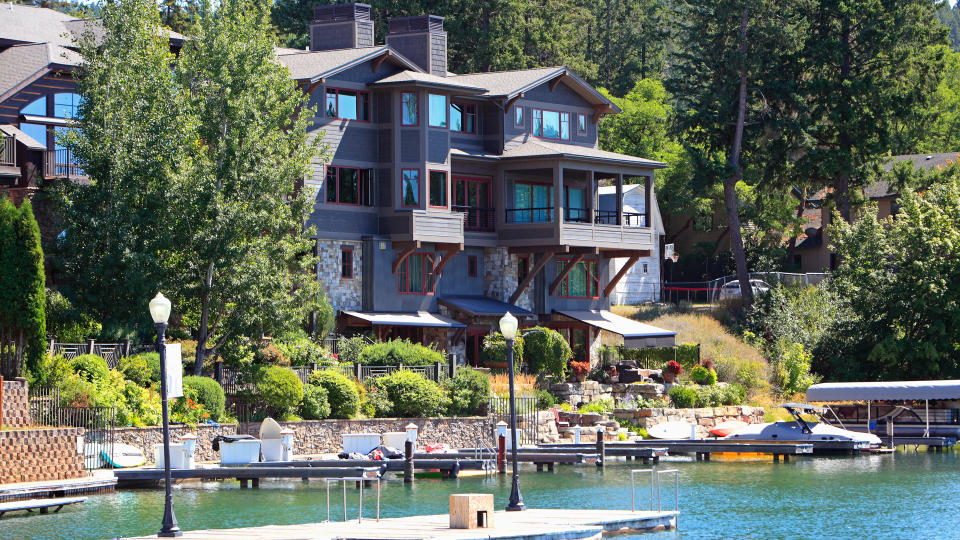
Just because you can afford to buy a piece of property does not necessarily mean that you should, particularly if that piece of real estate is located near the water. That is why the wealthy are known to steer clear of purchasing a home next to a lake, ocean or river — it’s a secret real estate tip of theirs.
Find Out: Barbara Corcoran: 3 Cities To Invest In Real Estate Now Before Prices Skyrocket
Try This: Become a Real Estate Investor for Just $1K Using This Bezos-Backed Startup
“While waterfront properties can offer stunning views and a unique lifestyle, they come with significant costs and risks that may not make them the best investment for every homebuyer,” explained Colten Claus, an Associate Broker with 8z Real Estate. “High maintenance and insurance costs, environmental restrictions, privacy concerns, resale challenges, and seasonal accessibility issues are all factors that potential buyers should carefully consider before making a purchase.”
Here are a few reasons why you should not be investing in a waterfront property — whether you’re rich or not.
Wealthy people know the best money secrets. Learn how to copy them.
High Costs and Maintenance
“Waterfront properties often come with a premium price tag, not just for the land but also for the cost of maintaining and protecting it,” Claus said.
That is because the proximity to water can generate higher costs for insurance. The risk of flooding, storms and erosion goes up significantly when water is involved.
“Additionally, the saltwater environment can cause accelerated wear and tear on structures, requiring more frequent and expensive maintenance,” he added.
Be Aware: Don’t Buy a House in These 3 Cities Facing a ‘Climate Change Real Estate Bubble’
Insurance and Risk Factors
Natural disasters like hurricanes, floods and rising sea levels due to climate change are all going to be risks that get factored into not only the safety of your property on the waterfront, but what it takes to insure it.
“Purchasing waterfront property usually means higher insurance premiums,” Claus described, highlighting that flood insurance, which is often mandatory, can be very costly. All of these risks can significantly impact the property’s long-term value and safety.
“These risks can also lead to substantial out-of-pocket expenses for repairs and replacements not covered by insurance.”
Limited Privacy and Crowds
Lots of people love the water, not just those who own a home near it. That means you might have unwanted company and feel the need to keep the shades drawn if you buy real estate near a popular waterfront destination.
“Waterfront properties, especially those in popular areas, can attract large crowds, especially during peak seasons,” Claus explained. He continued, “[This] can lead to a lack of privacy and increased noise levels, which may not be ideal for homeowners seeking a peaceful living environment. Additionally, public access points and easements can further limit privacy.”
Environmental Regulations and Restrictions
Waterfront properties are often subject to stringent environmental regulations and zoning laws aimed at protecting natural resources and ecosystems. “These regulations may limit the types of renovations or expansions homeowners can undertake, impacting the flexibility and personalization of the property,” said Kristin Hintlian, co-owner of Bonsai Builders.
As some examples, Hintlian said that “building an addition or installing a dock may require extensive permits and compliance with local environmental conservation laws, making the process more complicated and potentially expensive.”
“These regulations can limit how you can use and develop the property,” remarked Claus. “For instance, there may be restrictions on building docks, seawalls, or even making certain modifications to the home, which can impact the property’s usability and value.”
Resale Challenges
Buying a home on the water might be a bit of a challenge, but it is not completely out of the question. Selling it, however, can prove to be stressful and frustrating.
“While waterfront properties can be attractive, they also have a smaller buyer pool due to their higher costs and the additional responsibilities they entail,” Claus commented. “This can make it more challenging to sell the property quickly and at a desirable price.”
According to Hintlian, “These properties are often luxury purchases, which means they can be more susceptible to economic downturns. During periods of economic uncertainty, the buyer pool for high-end, non-essential properties shrinks, which can lead to longer times on the market and lower resale values.”
Claus added that the niche market of potential waterfront property buyers is much lower compared to non-waterfront buyers, “which can be a disadvantage if you need to sell the property quickly.”
Seasonal Use and Accessibility
“Some waterfront properties are only accessible or usable during certain seasons,” Claus said, citing the example of properties in colder regions and harsh climates can often be tricky to access during winter months due to ice and snow.
“This limited usability can affect the property’s overall value and appeal,” he remarked.
More From GOBankingRates
This article originally appeared on GOBankingRates.com: Real Estate Tips From the Wealthy: Why a Waterfront Property Isn’t Always Worth It
















